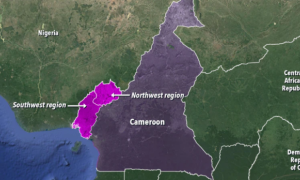come into possession of, come into the possession of
短语come into possession of指(人)占有〔获得〕某物,以人为主语; 而come into the possession of(物)为人所有,占有,以物为主语。例如:
When did he come into possession of those rare books?
他什么时候得到那些珍本的?
When did this rare books come into the possession of him?
这珍本什么时候被他得到的?
come to, add up to, amount to, count up to, run into
这五个短语动词都是“总计”的意思,其差别很细微:
1.从构成上说, add up to和count up to是动副介型短语; 而amount to, come to和run into是动介型短语。
2.从主语上说, add up to和come to相同,均多为钱、账单、数目等; amount to和run into的主语多为loss, cost, expense, debt, sum等名词; 而count up to的主语则仅限It。例如:
Our hotel bill added up to〔amounted to,came to〕 300 dollars.我们的旅馆费共计300美元。
His debts amounted to〔ran into〕 over 3000 dollars.他的债务已高达3000多美元。
It counts up to 300 dollars.共计300美元。
3.从宾语上说, add up to, amount to, come to后一般接数字; 而count up to和run into后除可接数字外,还可接名词。例如:
It counts up to a considerable sum.合计起来数目相当可观。
Losses run into six figures.损失高达6位数。
4.从使用场合上说, come to最通俗, count up to不常用。
come to this, come to that
come to this是“就是这样,出现这种情况”的意思; come to that指“事实上,无论如何”。
come, go
这两个词都可表示“来”。它们的区别是:
1.一般说来, come所表示的动作是朝向说话人或听话人的; 而go则用于运动方向。
2.在作定语时, to come意为“即将来到的”, to go则是“剩下”的意思。试比较:
You should always think of the danger to come.
你得经常想到今后的危险。
With only a few minutes to go, he went to school in a hurry.
只剩下几分钟了,他匆匆忙忙上学去了。
3.表示参加到说话人的活动中去时,通常用come (with),而不用go。
come, become, go, grow, turn
这组词都可用作系动词,表示“变成”。它们的区别是:
1.come多指向好的方向转变; go往往指向坏的方面转变; become指向好的(也可指向坏的)方面发展, turn是正式用语,指向好的,也指向坏的方面转变。试比较:
When did that style of dress come into fashion?
那种式样的衣服是什么时候时兴的?
When did that style of dress go out of fashion?
那种式样的衣服是什么时候不时兴的?
2.come的主语往往是人; become的主语可以是人或物; 而go的主语多是物。
3.come的表语通常是形容词; become的表语可以是形容词、代词或名词(须加不定冠词); go和grow的表语为形容词; turn的表语可以是形容词或名词(不加不定冠词)。
come, arrive
arrive和come都表示“到达”,但arrive强调对于目标的到达,而come则不强调目标。
He arrived in Beijing by the twelve o'clock train.
他是坐十二点的火车到北京的。
I have been waiting for hours and he still hasn't come.
我已等他好几个小时了,可他还没来。
come off, chance, take place
这组词(组)共同的意思是“发生”。它们的区别在于:
1.chance含有“偶然”发生的意味; take place和come off常指按计划“发生”。例如:
On our vacation we chanced upon an interesting antique store.我们度假时无意中发现一家有趣的古玩店。
The sports meet came off in spite of the rain.尽管下雨运动会仍如期举行了。
The talk is scheduled to take place tomorrow morning at eight o'clock.预定明早8时举行会谈。
2.take place的主语只能是事物; come off强调出现的结果。例如:
What may take place with telephones in the future?将来电话会发生什么变化呢?
The wedding came off in spite of Jim and Mary's last minute quarrel.尽管吉姆和玛丽结婚前最后一刻还在争吵,婚礼还是正常举行了。
3.chance是一个较庄重并带有几分古风的用语。例如:
It chanced that the winter of that year was a severe one.碰巧,那年冬天特别寒冷。
come into, enter
这两个词(组)共同的意思是“进入”。它们的区别是:
1.enter表示“进入”时,是相当正式的词,在会话中一般不常用。
2.enter可用作及物动词和不及物动词; 而come只用作不及物动词,后面接介词into后方可带宾语。例如:
He rose as we entered (the room).
He rose as we came into the room.
我们进屋时他站起身来。
come this way, step this way
这两个短语均为引导客人的用语,意思是“请这边走”,前者比后者客气一些。
come back, be back, get back, go back, return
这组词(组)都可表示“回去”。它们的区别是:
return与其他词相比有些书卷气; come back的意思是“回归”“回来”,指回到说话人所在的地方; go back指回到出发点,是一种非正式说法,常用于口语中; get back是回到原来的出发点; be back意为“回来了”,表示状态,是日常应用最广的非正式说法。例如:
Did Duff come back?—Yes, he came back.达夫回来了吗?是的,他回来了。
Now let's go back to the beginning of the page.现在让我们回到这页的开头。
When he got back, he found that supper was over.当他回来的时候,他发现晚餐已经结束了。
I'll be back next Saturday.我将在下个星期六回来。
下面两组中句子的意思不同:
She had come in third.
她比赛得第三名。
She had come on the third.
她于3号到达。
He comes from Shanghai.
他是上海人。
He has come from Shanghai.
他刚从上海来。
become,get,grow,turn,go,come
这些动词都可表示“变成,成为”之意。
become最普通用词,作为连系动词,指从一个状态向另一个状态的变化。
get常指某人或某物有意无意地获得引起变化的因素,结果使变成另一状态。
grow常指逐渐地变成新状态,强调渐变的过程。
turn侧重指变得与原来截然不同,有时含贬义。
go作为连系动词,通常与形容词连用,指进入某种状态,从而发生变化,多指不好的状态。
come侧重变化的经过或过程,多用于不良情况。
come,arrive,reach
这些动词都含“到达”之意。
come普通用词,含义广泛。强调到达的动作或进程,不侧重是否到达目的地。也可用于比喻意义。
arrive侧重到达目的地或达到某一目标。也可用作比喻。
reach既可指到达目的地,又可指到达途中的中间站。强调经过的周折或付出的努力。










